Job Boards Connect 2025 London: What's Actually Happening in the Industry (And What's Just Hype)

The job board industry is currently facing one of its toughest periods in recent years, and if you've been paying attention to the headlines or your own traffic numbers, you've likely noticed it. Job openings have dropped significantly from their 2022 peak (with at least 50% of job boards reporting fewer duration-based postings), job seekers are submitting thousands of applications to get one interview, and everyone from LinkedIn influencers to your competitors is saying AI is transforming everything.
I work with over 30 job boards, HR Tech companies and Job Board SaaS vendors on everything from AI implementation and SEO to market strategy and monetization. That puts me in a position to see patterns that most people miss when they're focused on running their own platform day to day.
So, I was delighted when Louise Triance and Louise Grant invited me to join them on stage and open the Job Boards Connect 2025 in London this year.
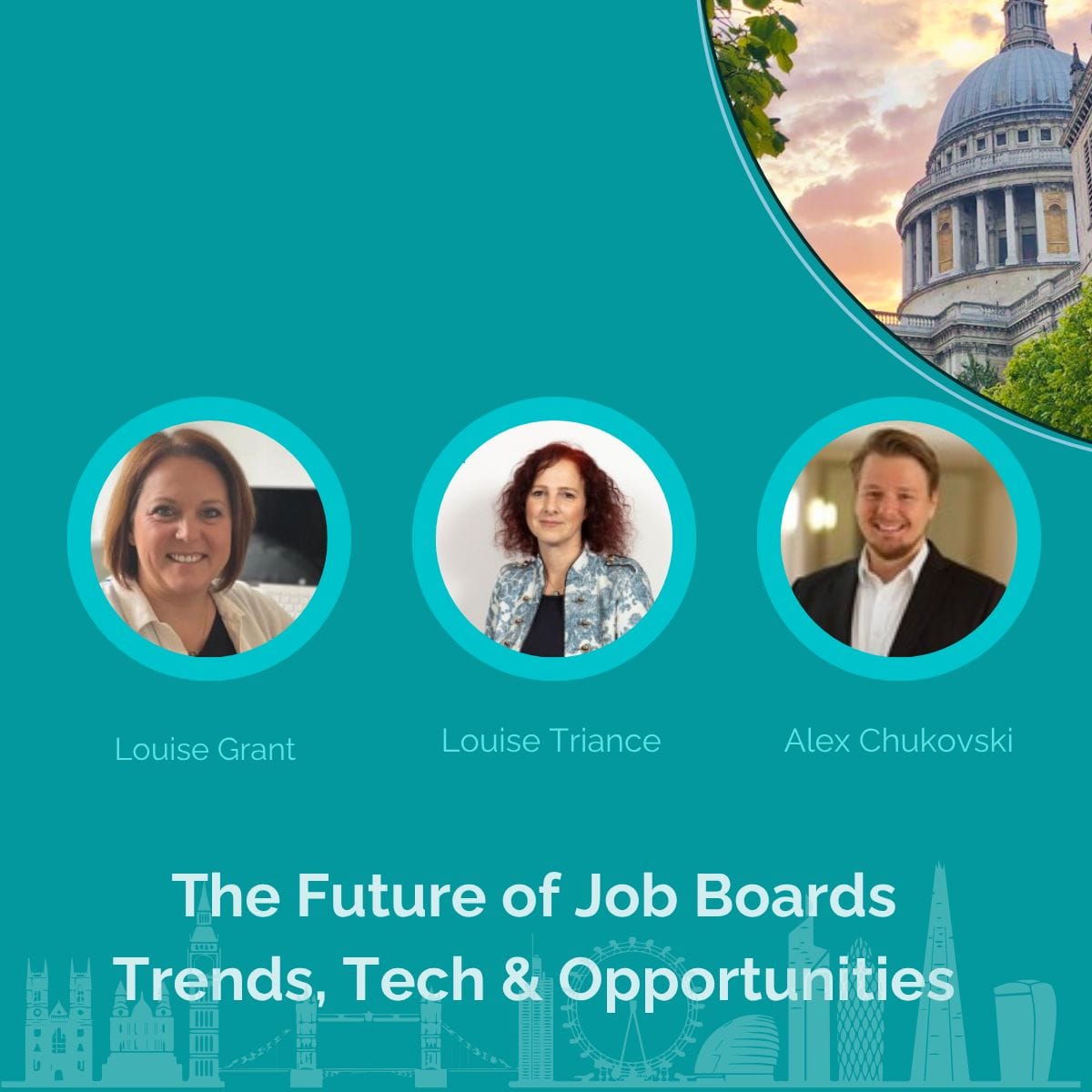
I analyzed what's really happening in the market right now, distinguishing the fundamental changes from the noise. Here's what the data reveals about our position in October 2025, what's driving the slowdown, and where the opportunities are if you know where to look.
Is AI really behind the drop in hiring that causes revenue loss?
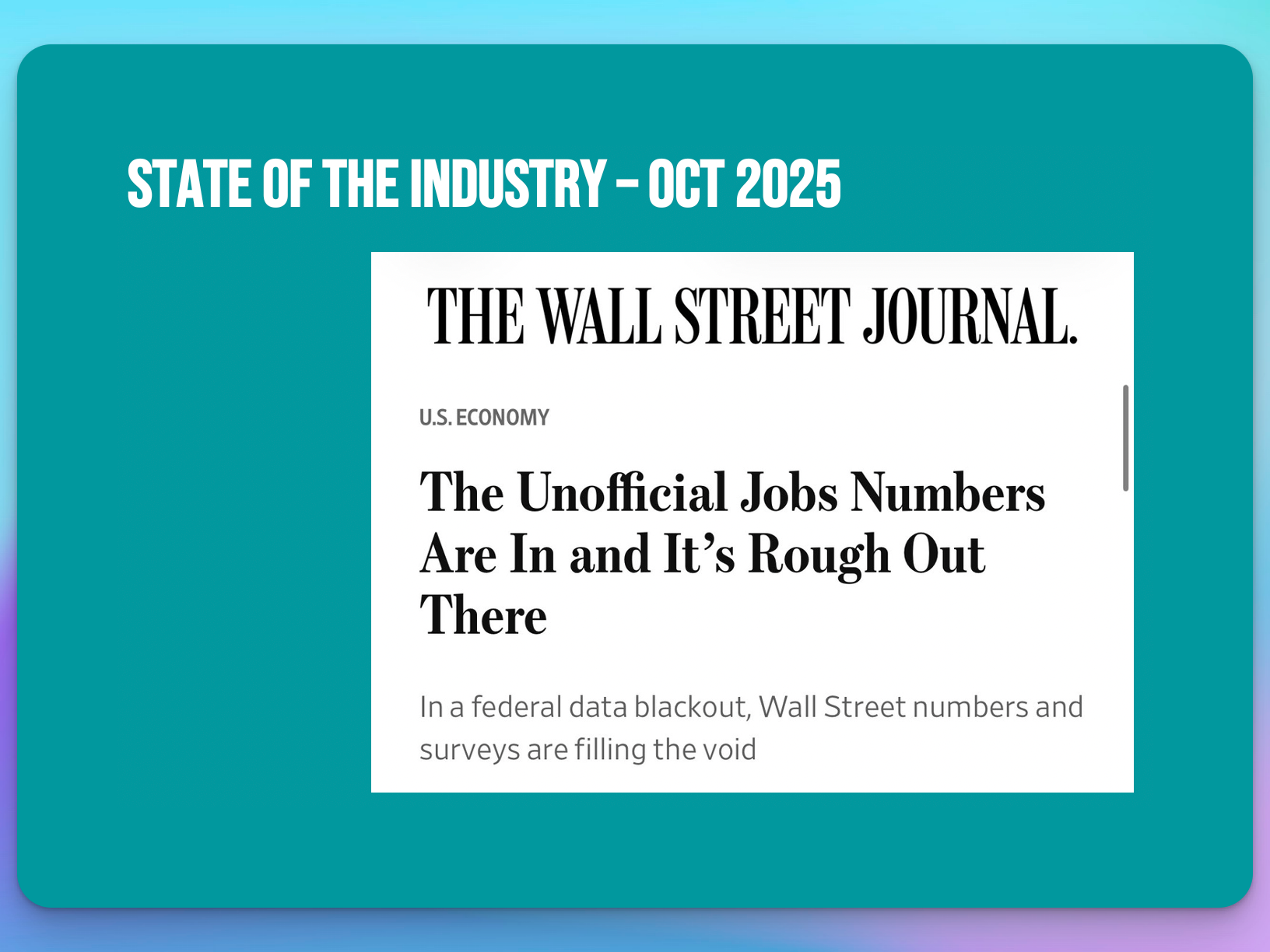
The unofficial job figures are in, and they're showing a pretty bleak picture. About half of job board owners expect job postings to decline, and only 50% are optimistic about the future. With federal data currently unavailable, everyone is relying on Wall Street numbers and surveys to understand what's really happening. The Wall Street Journal has been covering this gap extensively. The question is whether this is just a temporary rough patch or something that will last. There is a lot of uncertainty about what's causing the decline and whether the factors behind it will resolve themselves or become part of the new normal in the job market.
If you spend any time on LinkedIn, you'd think AI is the reason hiring has slowed down. Every other post seems to claim that companies are doing more with fewer people thanks to AI efficiencies.
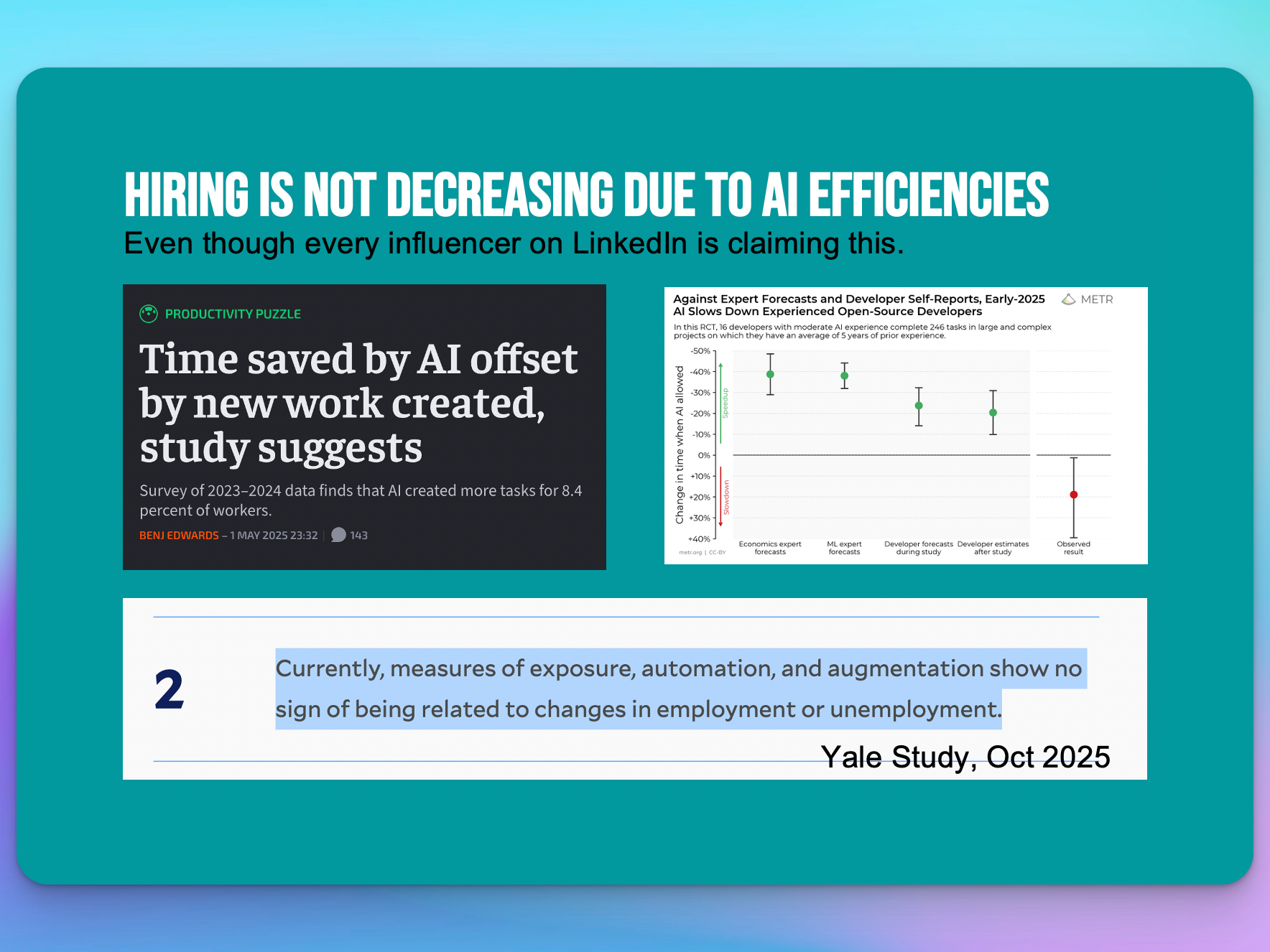
But the data doesn't support that. At least three studies show that AI hasn't resulted in the productivity gains people keep talking about. One study found that any time saving from AI gets immediately offset by another task. Another study examining developer self-reports from early 2025 found a huge gap between developers’ self-rated productivity gains from AI and reality (they were 20% slower). Yale released research in October 2025 that is probably the most direct on the topic: measures of exposure to AI, automation, and augmentation show no relationship with changes in employment or unemployment. The gap between what people claim AI is doing and what it's actually doing is wide right now.
But what is the truth here? Here is my perspective.
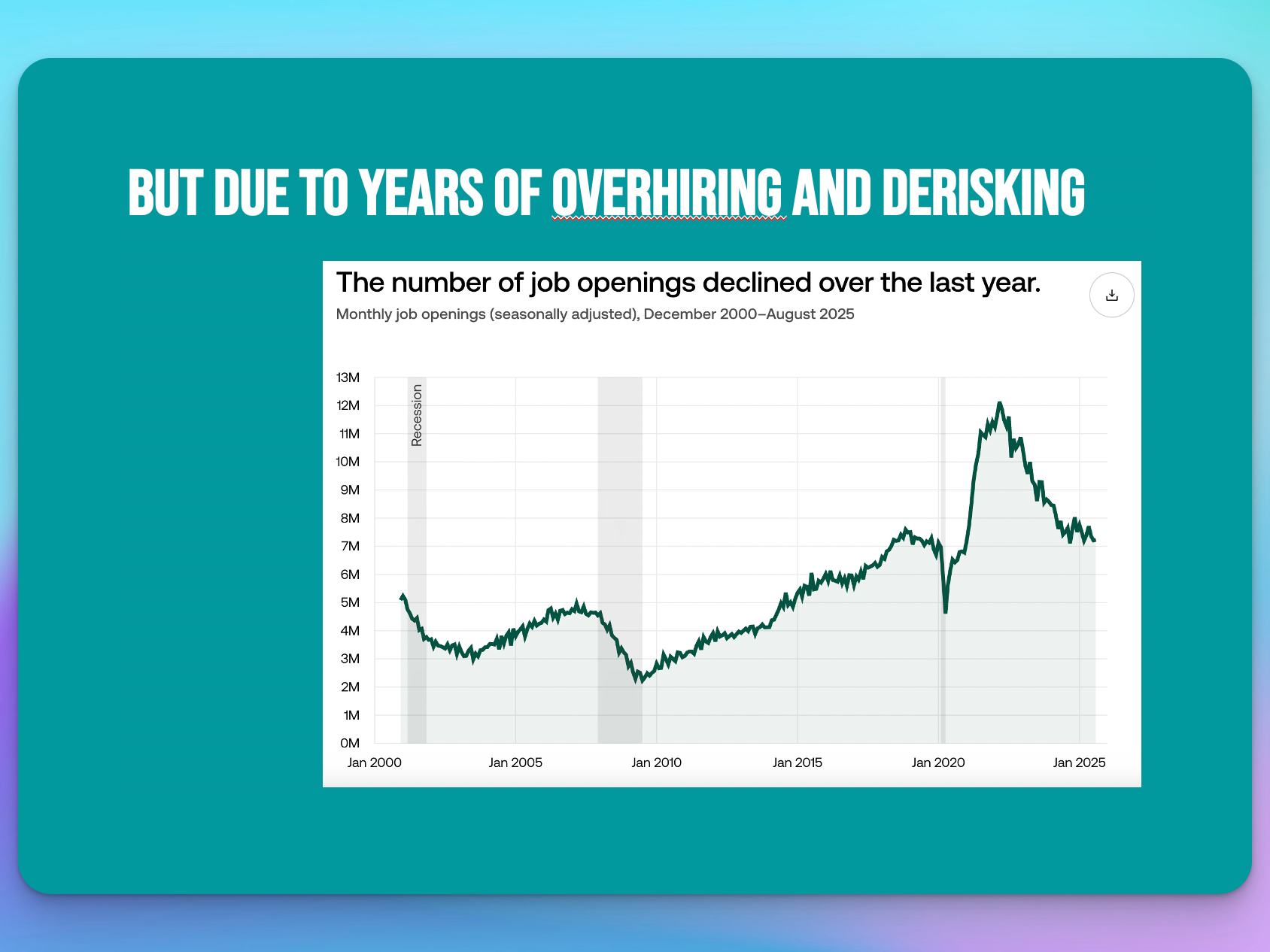
Companies spent years hiring heavily, and now they're pulling back sharply. Job openings soared to levels not seen in decades, peaking around 2022, and have since dropped significantly from that peak. Management made bold hiring decisions during the boom, but instead of admitting it, many companies point to AI as the reason they need fewer workers. Even with the recent decline, current levels remain above the historical averages of most of the past 25 years. This is a correction after overhiring rather than a fundamental change. Cycles do end eventually, but they can last longer than expected. If you're planning for the next few years, assume this slowdown could take some time to resolve before things stabilize again.
Do you like this blog post? Subscribe to receive my latest writing and never miss a post!
What job seekers are actually experiencing
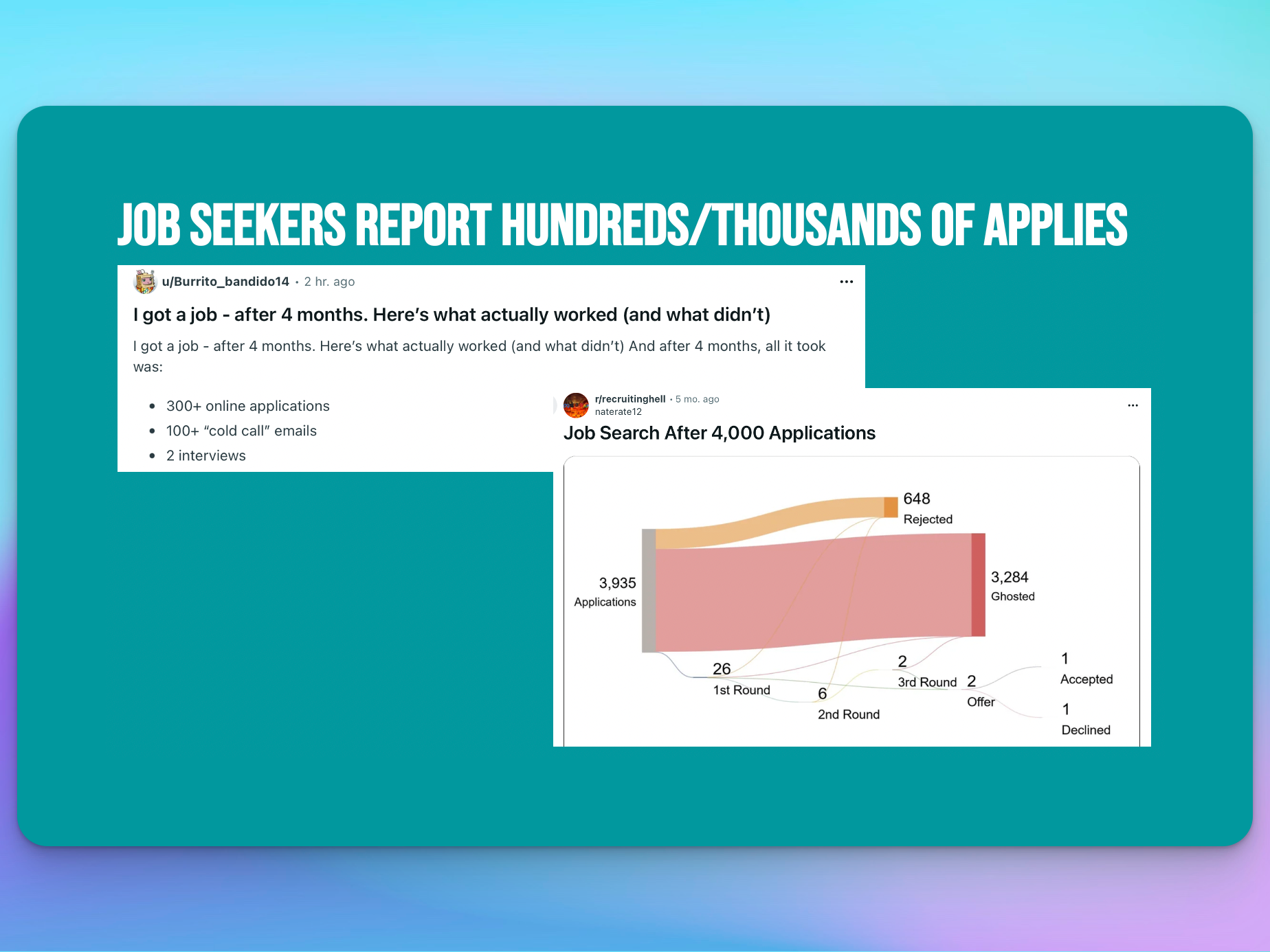
People searching for jobs nowadays are facing numbers that seem almost unbelievable. I showed a few screenshots from Reddit's Recruiting Hell. One individual shared that they sent out over 300 online applications, made more than 100 cold-call emails, and secured just two interviews before finally getting hired after four months. Another person tracked their entire job hunt and found it took nearly 4,000 applications to land a position. Among those thousands of applications, they received 26 first-round interviews, six second-round interviews, two offers, and declined 1 before accepting an offer. The visual of that breakdown is striking because the rejections and ghosted applications far outweigh everything else. This 4- to 9-month process, involving thousands of applications, isn't just exhausting people; it's also changing how job seekers behave and approach the process in ways we haven't seen before.
The growth in paid job boards
That desperation is creating its own market. When the job market gets this tight, platforms start charging job seekers directly, and it's working. There's been an explosion of paid job boards where people pay subscription fees to access listings or get their applications seen. Membership tiers range from $7 a week to $63 a year, with lifetime access options at $89. These aren't small niche sites either – RemoteRocketShip shown here is "loved by 10,000+ remote workers." Yes, people like the product and are happy paying for it.
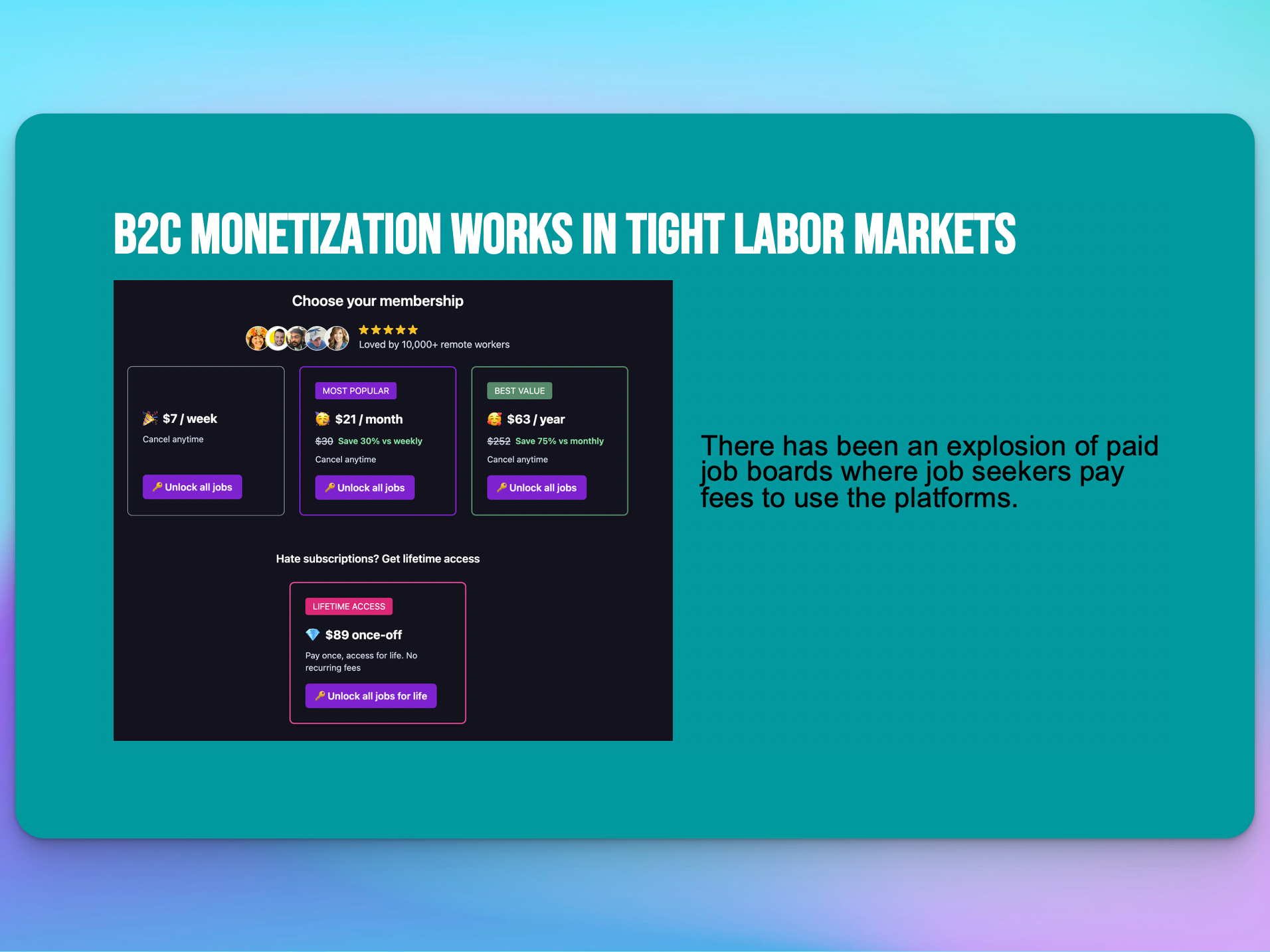
This is the first time in a long period that I have seen four paid job boards at Job Boards Connect!
You can debate whether it's ethical to charge people who are already struggling to find work, and there are definitely mixed feelings about it. Still, the reality is these paid boards keep popping up because desperate job seekers are willing to pay for any advantage. When you're throwing out thousands of applications and getting nowhere, spending $21 a month for better access or visibility starts to feel reasonable.
SEO is getting harder for job boards through external competition and AIO.
The job board industry is no longer still. New competitors like career.io, Teal, and Rezi have entered the scene. Each of these platforms operates its own job board as part of a wider user acquisition plan (Rezi's one is not public yet). What makes them harder to compete with is that they've built entire content ecosystems around job searching. They publish guides, tools, resume builders, career advice, and various other resources that keep users returning to their platforms instead of yours. Most traditional job boards haven't invested in that kind of content infrastructure, so when job seekers look for anything related to careers, these newer players are increasingly appearing in organic search results. You're no longer just competing on who has the most job listings.
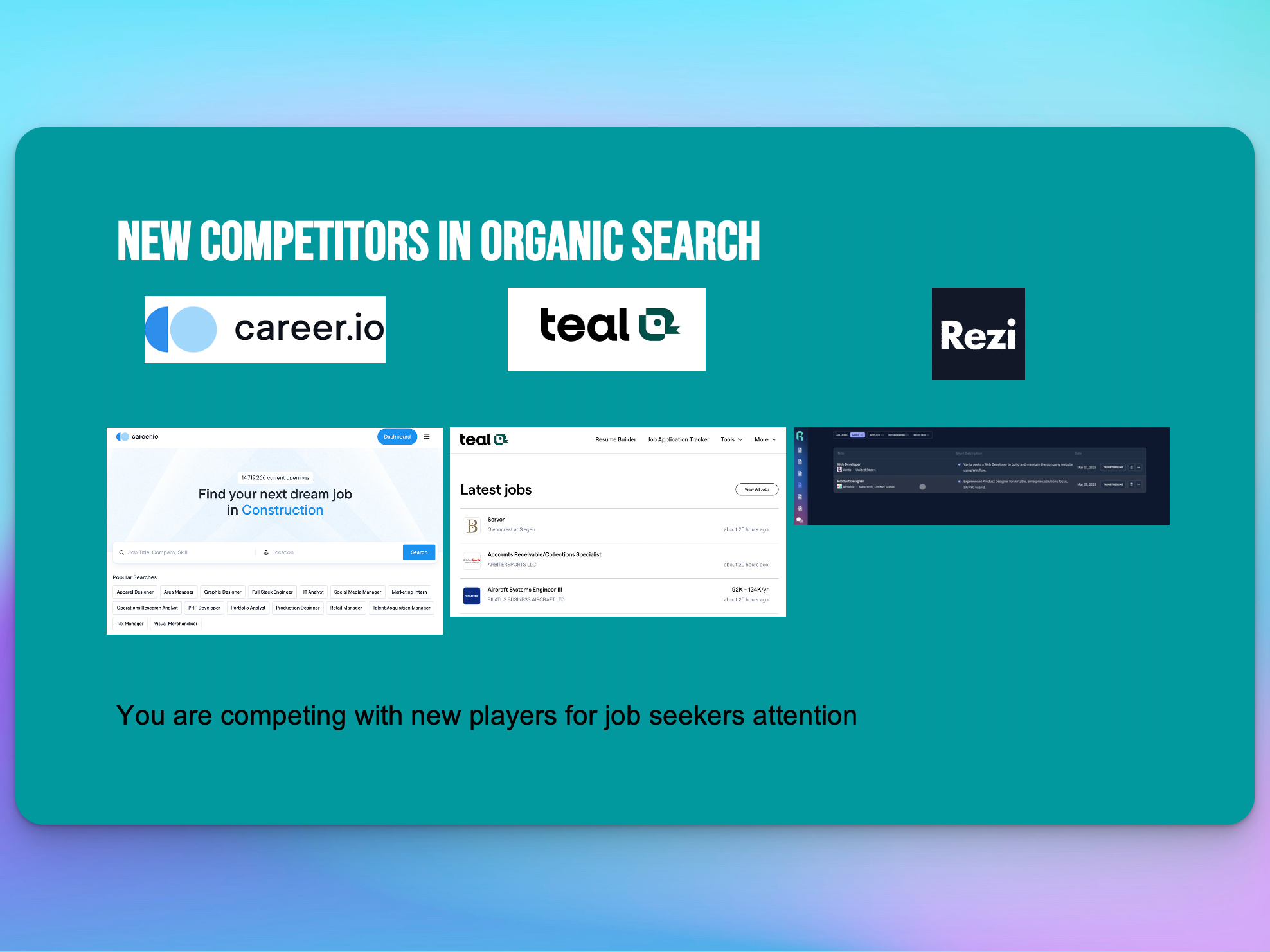
This shift is compounded by changes in how Google itself works. AI Overviews are making SEO more challenging, especially for informational content. Ahrefs published data in April 2025 showing that AI Overviews reduced clicks by 34.5%. When someone searches for career advice, resume tips, or job search strategies, they're increasingly getting their answer right in the AI-generated summary at the top of the search results without ever clicking through to your site. For informational keywords, you can expect traffic to keep declining as more queries trigger these overviews.
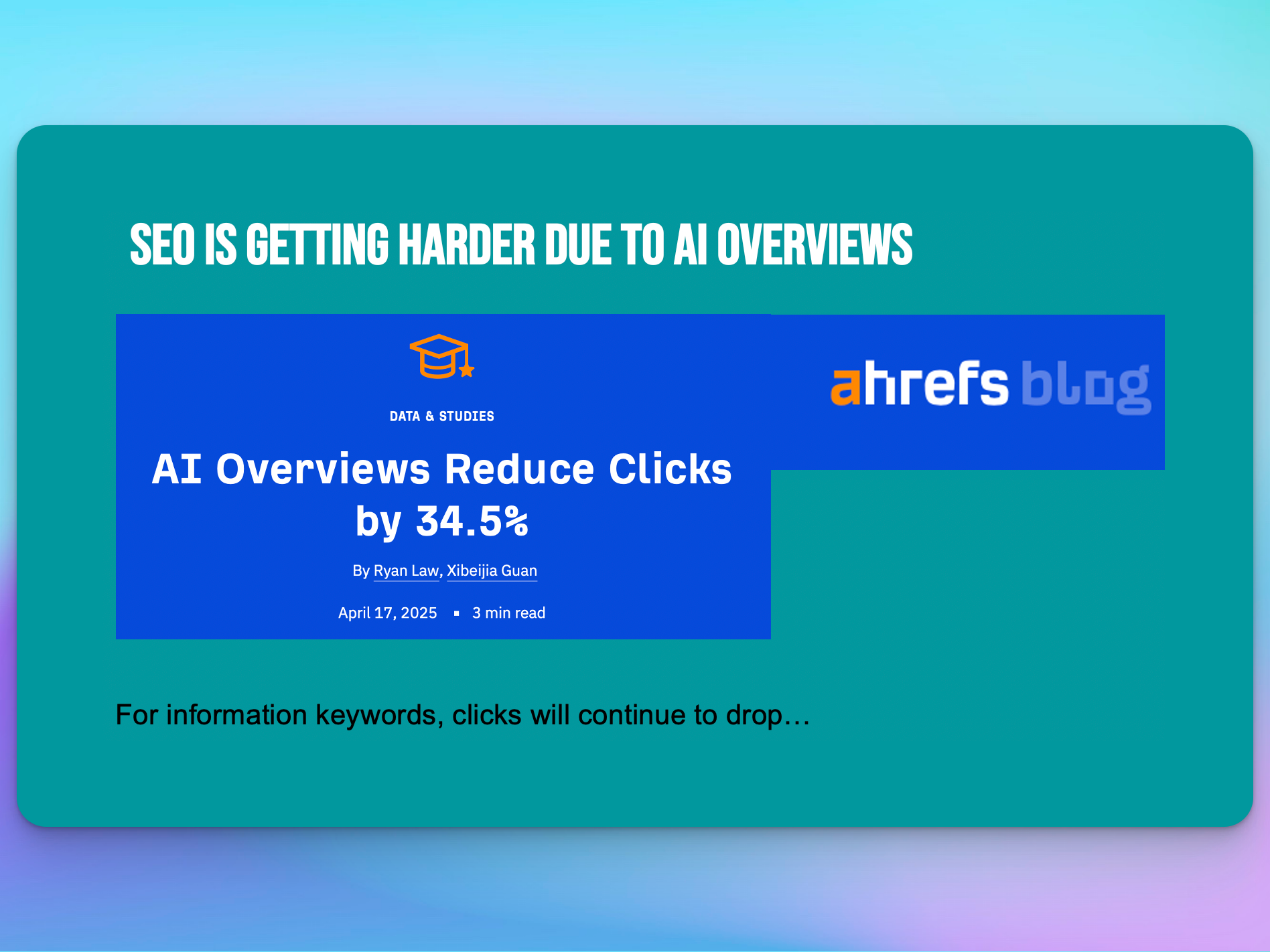
The silver lining is that traditional (programmatic) SEO still works well, specifically for job boards:
When people search for actual jobs, they need to click through to view listings and apply. AI Overviews can't do this for them. Unlike informational queries, where Google can summarize the answer and users never leave the search page, job seekers have to visit your site to complete what they're trying to do. That transactional nature helps keep this traffic relatively safe from AI disruption, at least for now.
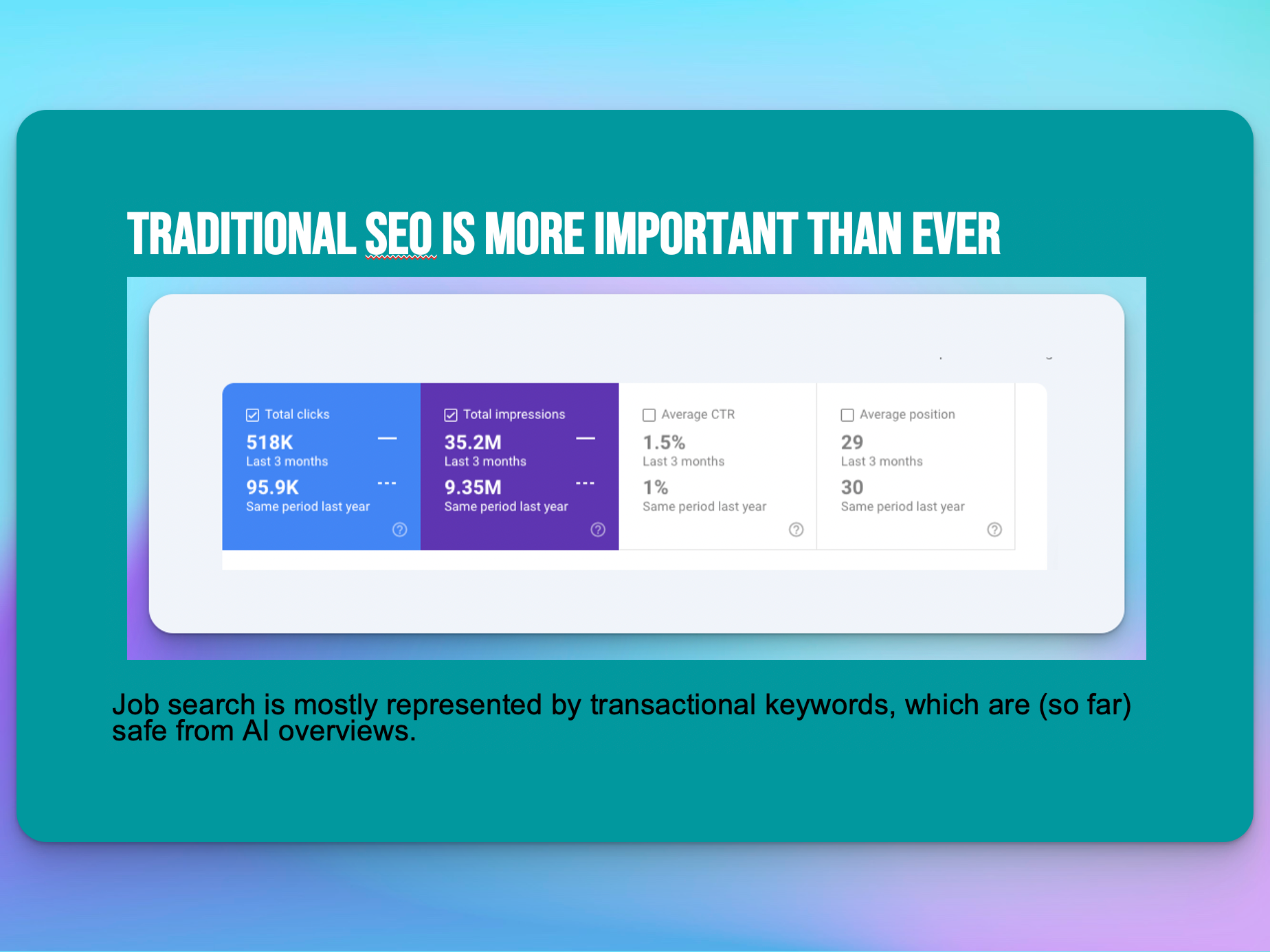
In the screenshot above, I demonstrate a client I have advised on rebuilding their job board, seeing a substantial growth in organic traffic with 518K total clicks and 35.2M impressions from 95K clicks in the previous period. This is clear sign that SEO strategies still work for job boards.
Where AI actually matters (and where it doesn't)
Indeed surpasses other job boards in expanding AI use. OpenAI's list of clients processing over 1 trillion tokens prominently features Indeed.
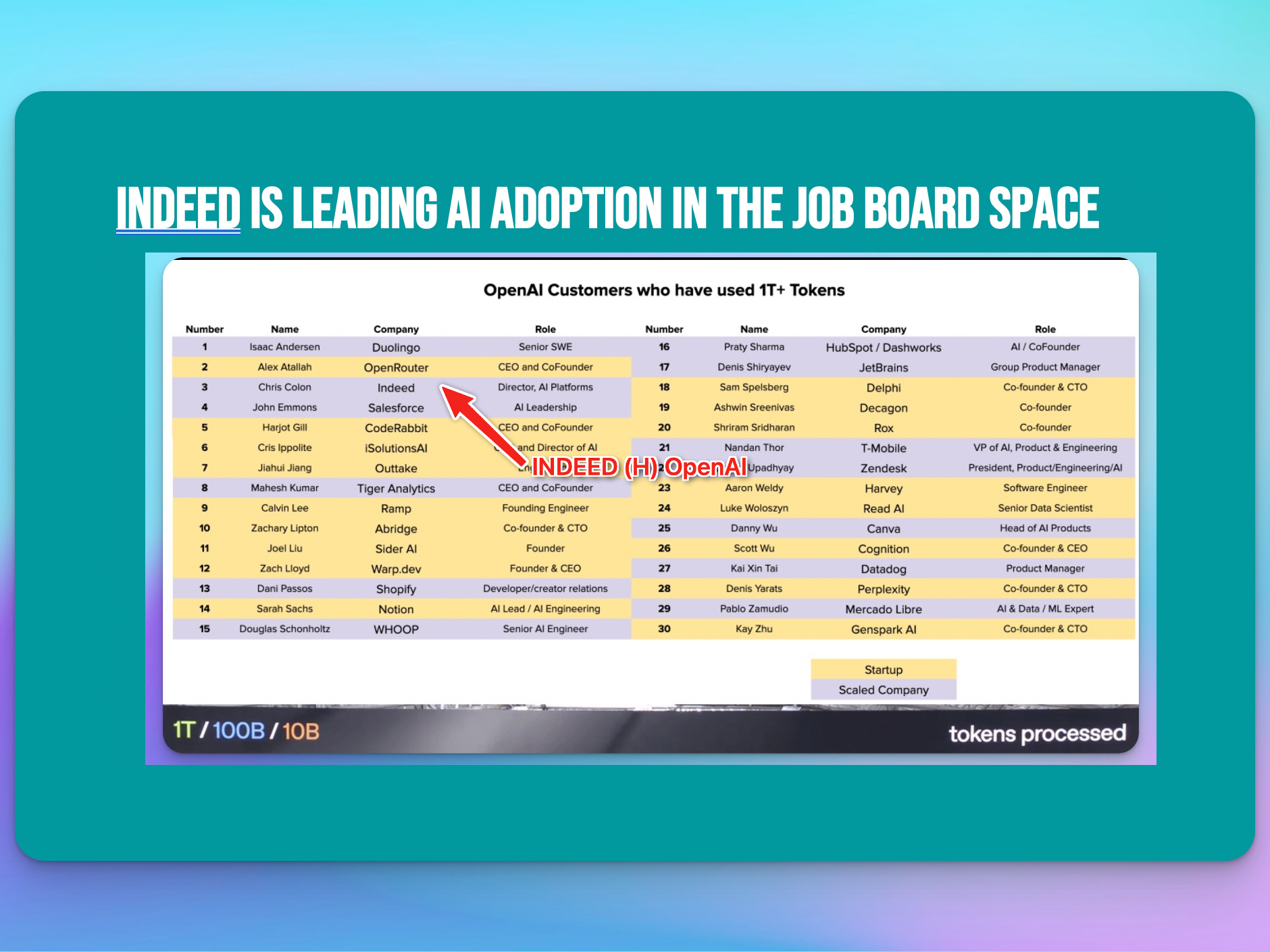
They are not just testing AI features or running small pilot programs; managing such a volume of tokens involves integrating AI into essential platform functions like matching algorithms, search, resume parsing, and job data structuring. While most job boards are still figuring out where AI fits, Indeed has already moved past that phase and is deploying it in production at a level similar to companies like Salesforce, Abridge, and Notion. But is the gap between Indeed's AI capabilities and what smaller job boards can afford to develop so large?
At the end of the day, you and Indeed have access to the same APIs and products. The question that always comes is, what are the specific areas where AI can actually help job boards right now?
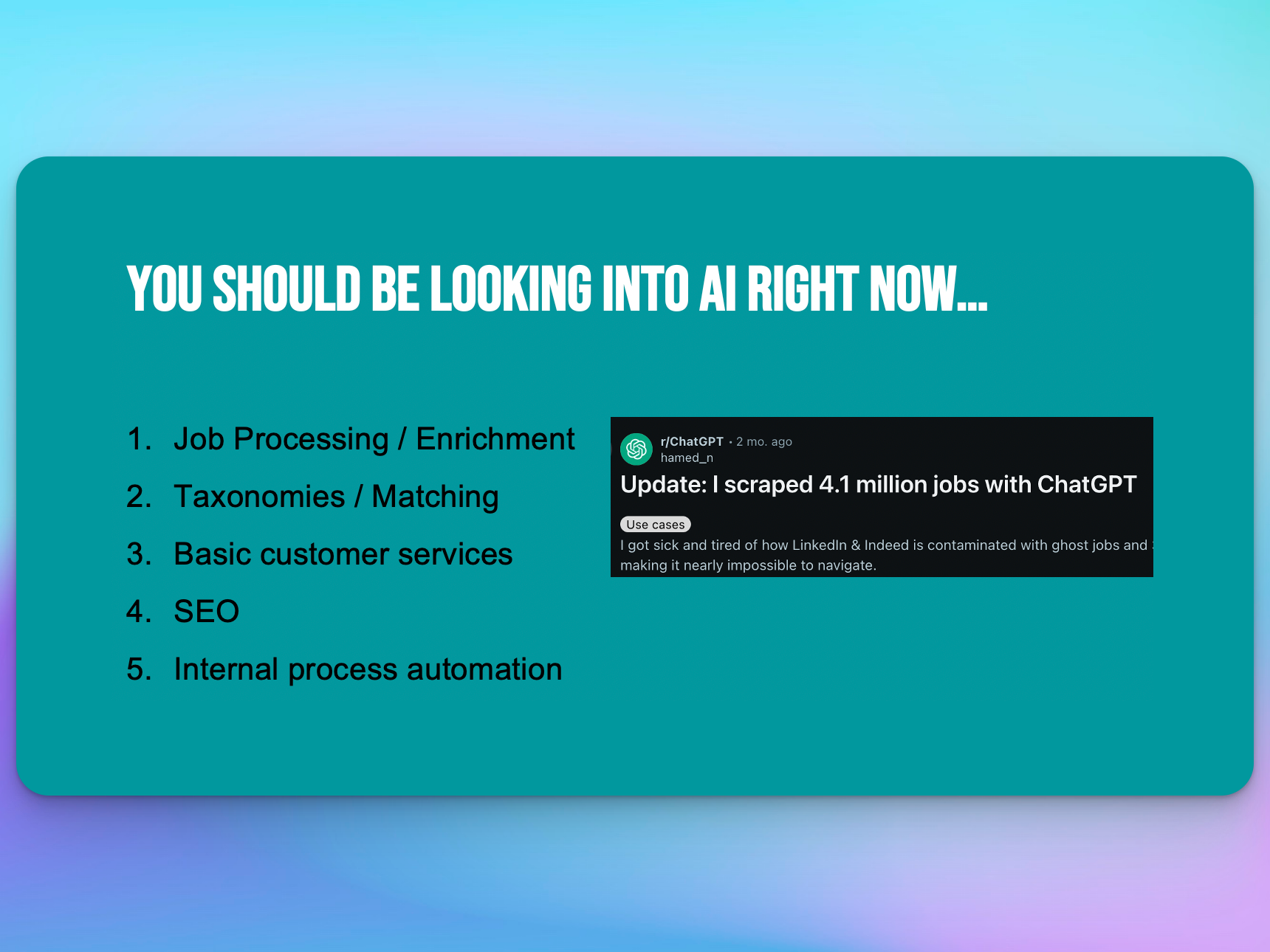
Job processing and enrichment is one: Jobcafe’s founder told his story of scraping 4.1 million jobs with ChatGPT. AI can clean that data, standardize fields, and fill in missing information. Taxonomies and matching are other areas where you can use AI to improve how jobs are categorized and how candidates are matched to roles.
Basic customer service queries can be automated without much risk. SEO is a practical use case too, especially given the amount of data job boards have that can be used to generate quality content with a bit of LLM magic.
Internal process automation might be the easiest win since it doesn't directly touch users. The tools Indeed has access to are mostly the same ones available to smaller job boards. The difference is that they're already running experiments and implementing what works, while others are still debating whether to start.
The flood of applications no one wants to talk about
Job seekers have realized they can use AI too, and it's creating chaos. Companies are posting about receiving over 1,000 or 2,000 applications for a single role. I collected a couple of recent examples from Linkedin showing them here:
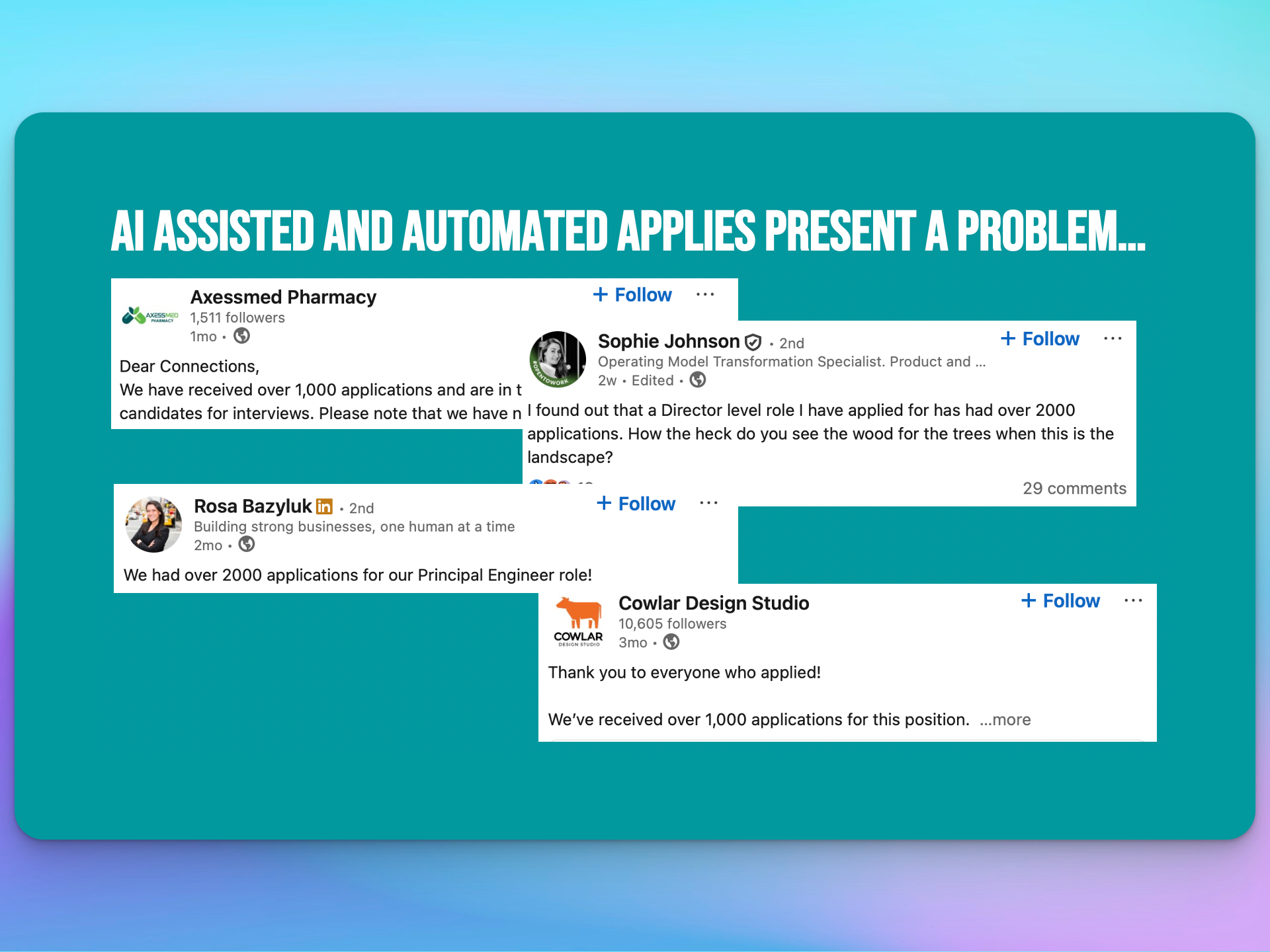
AI-assisted and automated job applications are responsible for much of this volume. At the last conference, some CEOs of large UK-based job boards still claimed this wasn't a real problem, but that’s hard to defend now. You are wrong if you think that AI-augmented resumes are not causing a marketplace collapse.
When job seekers can send hundreds of applications with little effort using AI tools, and employers are flooded with thousands of mostly unqualified resumes, the system stops working efficiently. Nobody wins when the signal-to-noise ratio becomes this poor.
However, inefficiencies like this create opportunities. For example, a hiring manager posted about receiving over 1,000 applications for a single role, then noted that only dozens were truly qualified. That gap between application volume and qualified candidates is where job boards can make a difference. If you can filter out the noise and highlight the candidates who actually meet what employers need, you're addressing a real pain point that is worsening. Companies are desperate for ways to cut through the spam without manually reviewing thousands of applications.
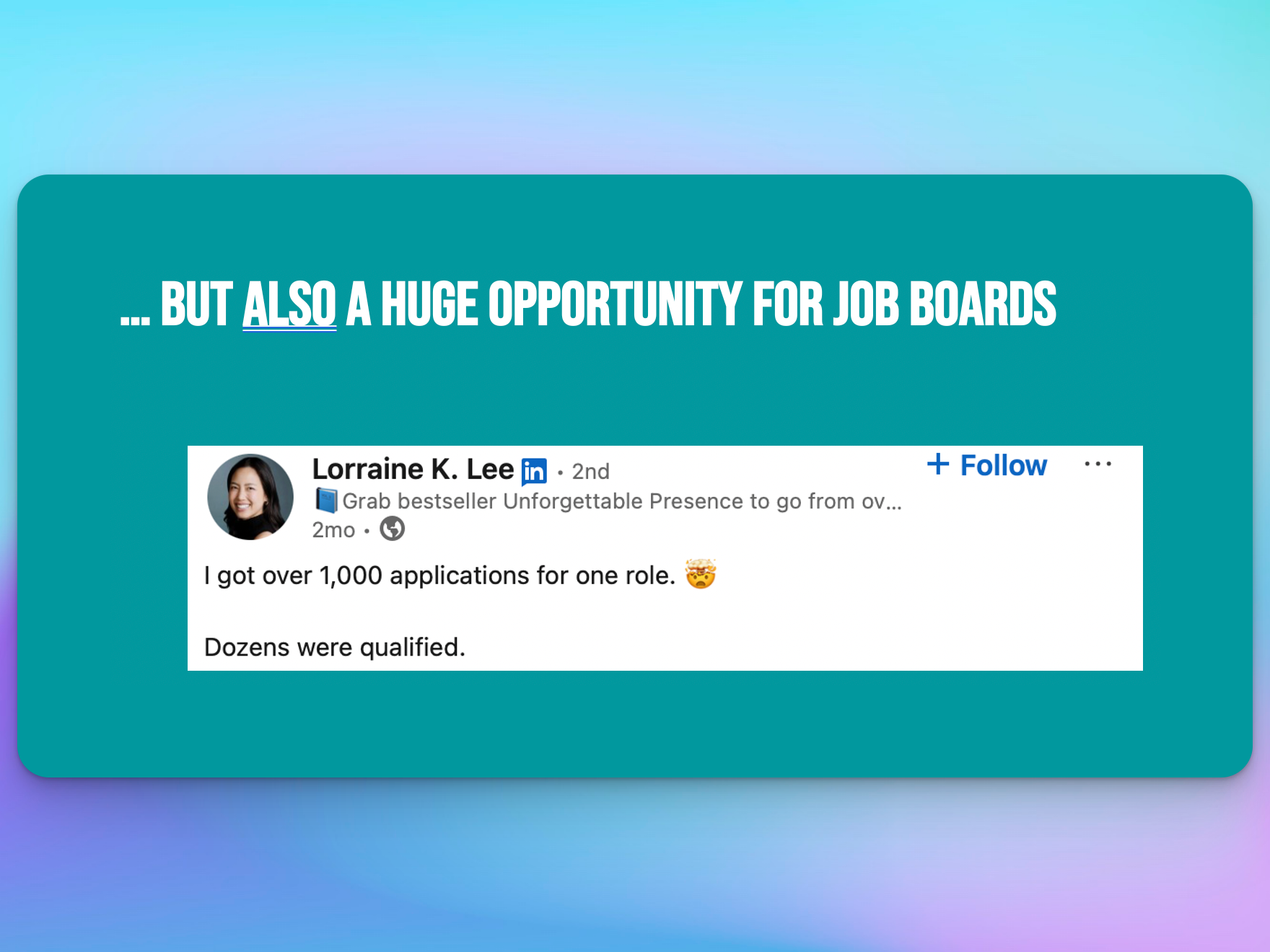
Whoever figures out how to do that effectively, whether through better matching algorithms, verification systems, or some other approach, has a real business opportunity in front of them.
New marketplaces in online recruiting exist
New marketplaces are emerging to address problems that barely existed a few years ago. Mercor developed a platform specifically for AI training talent, and they're reportedly aiming for a $10B+ valuation on a $450M revenue run rate.
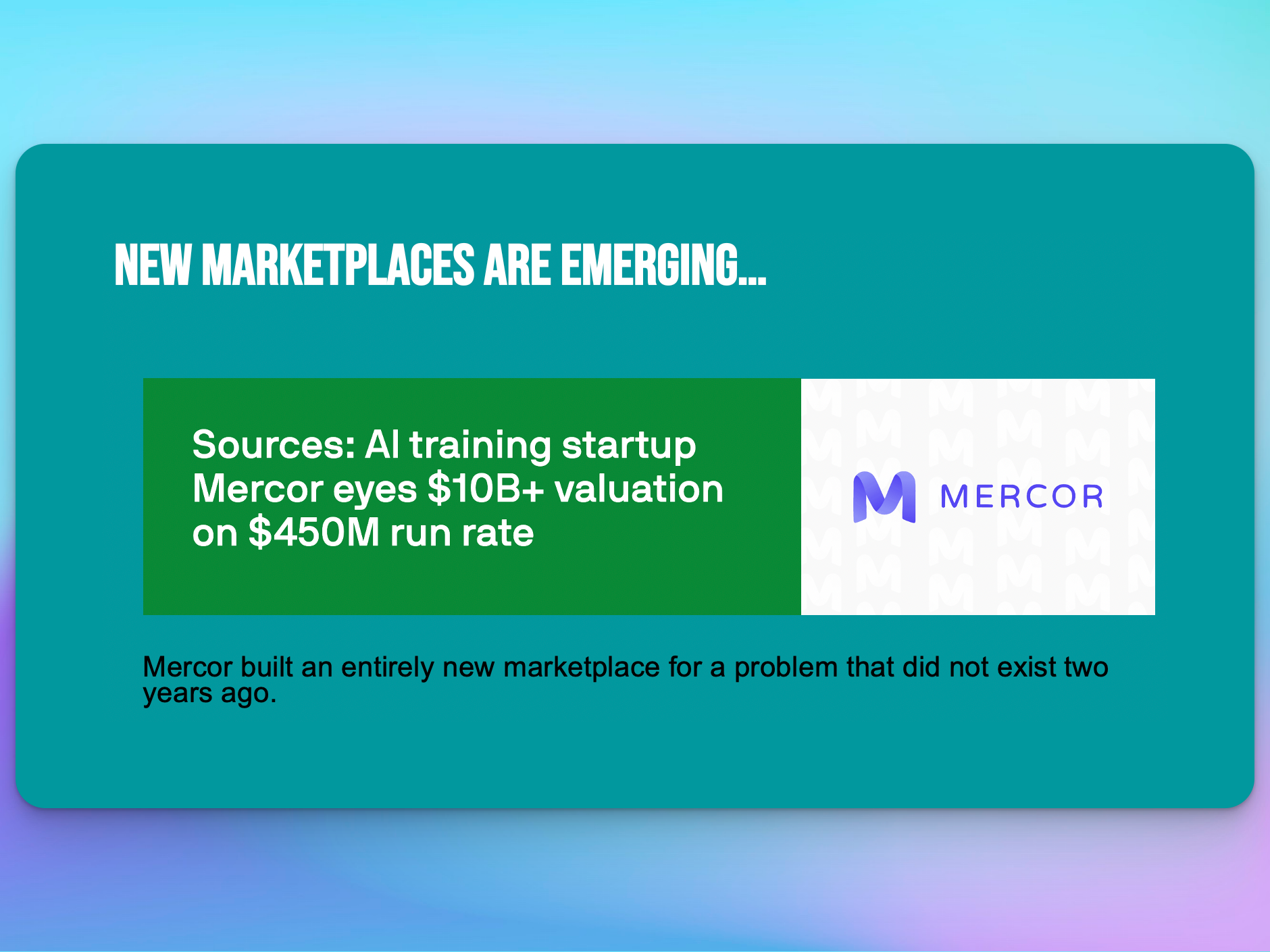
Two years ago, there wasn't a clear market for AI trainers. Traditional recruiting channels weren't designed to find or verify people with those specific skills. Mercor recognized that gap and built a marketplace with candidate profile validation tailored to what companies hiring AI trainers actually need. They're not competing with Indeed or LinkedIn for general job listings—they carved out a niche where existing platforms weren't serving either side of the market well.
I highly recommend you listen to Lenny's Podcast with one of Mercor's cofounders to learn more about their business model.
That's the kind of opportunity that arises when the job market shifts rapidly and established platforms are too slow to adapt.
Meanwhile, OpenAI is apparently making some move into online recruiting, though what exactly they're building isn't clear yet. It could be they're going after part of the candidate evaluation market, using their AI to screen or assess applicants. Or this could just be a PR stunt that amounts to little. Big tech companies have tried and failed to break into recruiting before—Google had Google Hire, Facebook had job listings, Twitter had a careers section. None of them really disrupted the space.
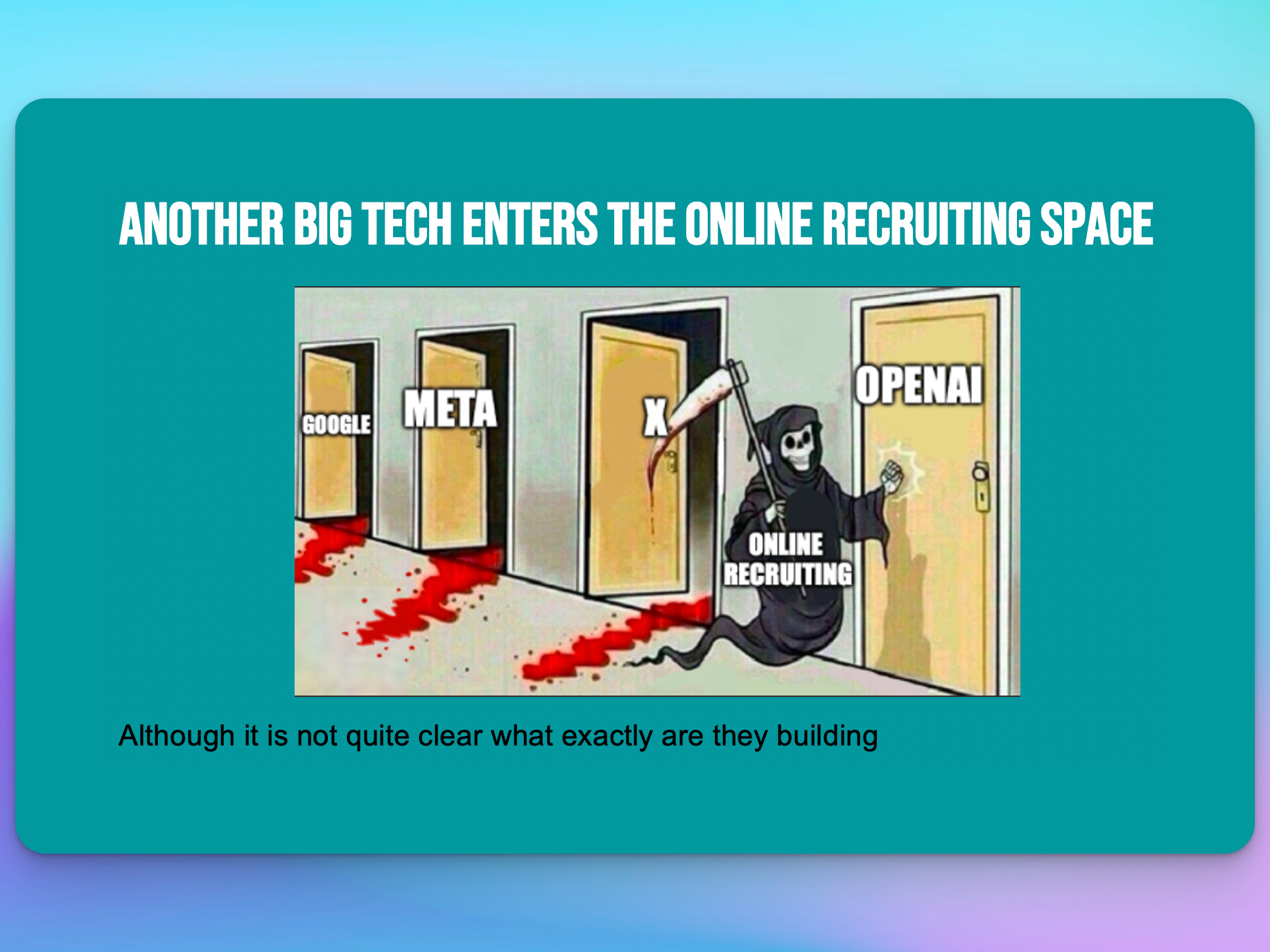
Whether OpenAI has something genuinely different or if they're just another big name thinking they can waltz into recruiting remains to be seen.
What this means for your job board
The future depends on three key points:
- First, use AI where it clearly adds value. Focus on problems with obvious benefits, whether that's saving money or increasing income. Don't adopt AI just because it's popular.
- Second, the current market causes real struggles for both employers and job seekers. Employers are overwhelmed with applications they can't handle. Job seekers are sending out thousands of applications and getting nowhere. You understand these issues better than big tech companies do, so identify which pain points you can address and develop solutions for them.
- Third, those who shape how the marketplace adapts to these changes will have an edge. Mercor didn't wait for Indeed to create an AI training solution. They acted first and seized that opportunity. If you see a gap in your niche, take it before someone else does.
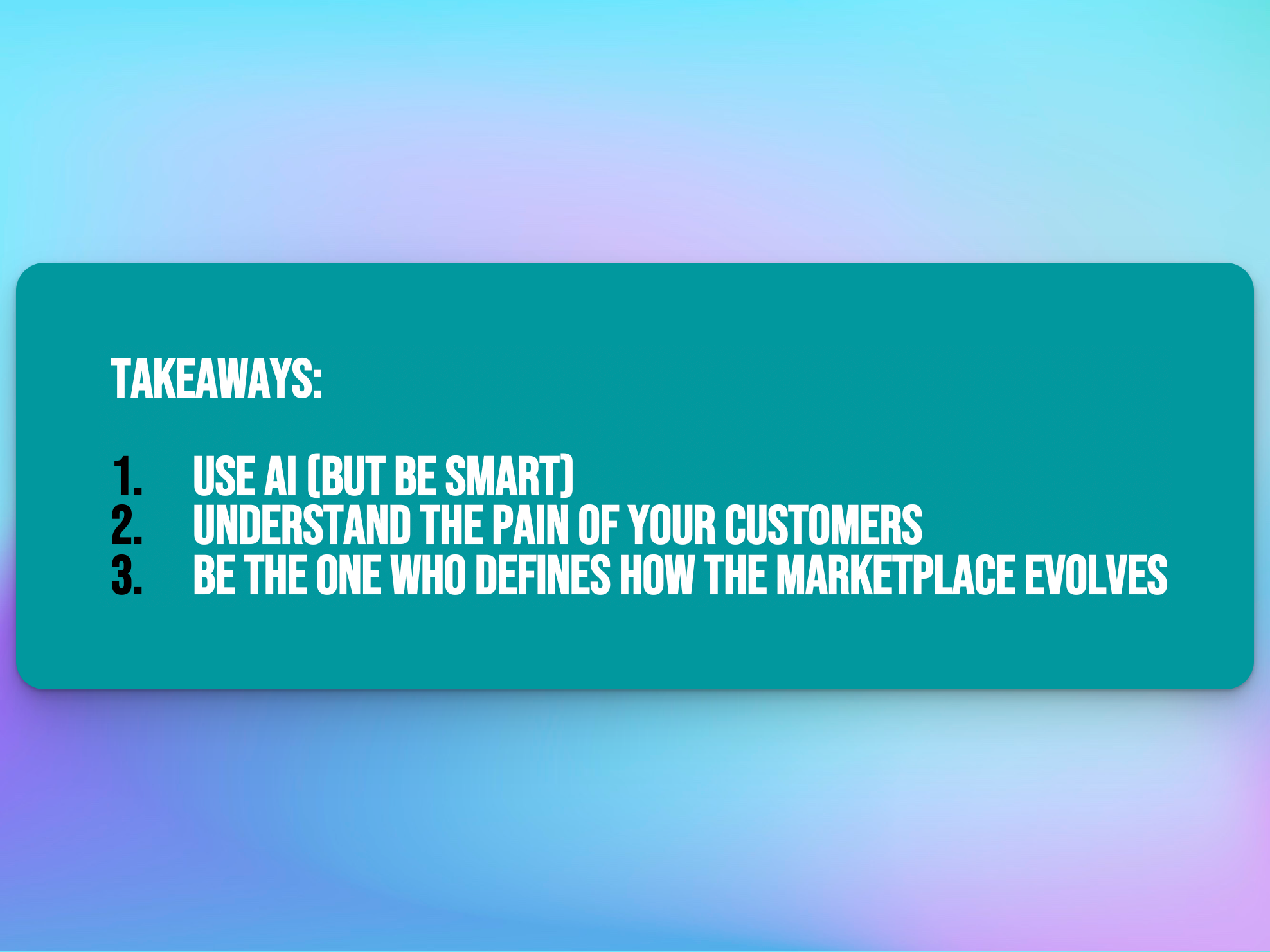
We're in a correction phase, not a collapse. The fundamentals of job boards haven't changed - people still need jobs, companies still need to hire, and someone needs to connect them efficiently. What has changed is the volume of noise in the system and the tools available to cut through it. The job boards that figure out how to restore signal in a world flooded with AI-generated applications will be the ones still standing when this cycle turns. The question is whether you'll be reactive or proactive about that transition.